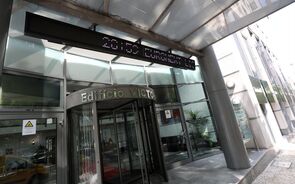Bank of America or THE Bank of America?
2 mensagens
|Página 1 de 1
Bank of America dispara mais de 30% depois de rejeitar nacionalização
Os títulos do Bank of America dispararam mais de 30% depois dos responsáveis do banco terem rejeitado a nacionalização e de terem referido que a instituição não necessita de mais capital do governo.
--------------------------------------------------------------------------------
Lara Rosa
lararosa@negocios.pt
Os títulos do Bank of America dispararam mais de 30% depois dos responsáveis do banco terem rejeitado a nacionalização e de terem referido que a instituição não necessita de mais capital do governo.
Os títulos do Bank of America seguiam a ganhar 32,64% para os 6,42 dólares, depois de já ter estado a ganhar mais de 34%. Apesar da forte valorização de hoje o banco norte-americano acumula uma desvalorização de quase 54,5% desde o início do ano.
Os responsáveis do Bank of America sublinharam que o banco não vai ser nacionalizado, contrariando as expectativas que ontem pairavam no mercado.
Apesar de ter encerrado em alta na sessão de ontem, acompanhando a tendência do sector, as acções do banco estiveram a desvalorizar quase 20%, com os investidores a acreditarem que o desempenho negativo dos títulos da instituição, desde o início do ano, levaria a que o banco voltasse a necessitar de ajuda do governo dos EUA, ou que fosse nacionalizado.
No entanto o presidente executivo do Bank of America, Kenneth Lewis, afirmou hoje numa entrevista à CNBC, citada pela Bloomberg, que a ideia de nacionalizar o banco “não tem uma possibilidade remota” de existir.
Além de assinalar que o banco não vai ser nacionalizado, Lewis assinalou ainda que o Bank of America não vai receber ajuda dos governantes norte-americanos uma terceira vez.
Em Janeiro o governo dos EUA investiu mais 20 mil milhões de dólares (15,2 mil milhões de euros) no Bank of America, depois de já terem atribuído 25 mil milhões de dólares ao banco e ao Merrill Lynch.
Os responsáveis da maior economia do mundo anunciaram ainda um plano para garantir 118 mil milhões de dólares (89,7 mil milhões de euros) dos seus activos para ajudar a instituição a adquirir o Merrill Lynch.
Jornal negócios
Os títulos do Bank of America dispararam mais de 30% depois dos responsáveis do banco terem rejeitado a nacionalização e de terem referido que a instituição não necessita de mais capital do governo.
--------------------------------------------------------------------------------
Lara Rosa
lararosa@negocios.pt
Os títulos do Bank of America dispararam mais de 30% depois dos responsáveis do banco terem rejeitado a nacionalização e de terem referido que a instituição não necessita de mais capital do governo.
Os títulos do Bank of America seguiam a ganhar 32,64% para os 6,42 dólares, depois de já ter estado a ganhar mais de 34%. Apesar da forte valorização de hoje o banco norte-americano acumula uma desvalorização de quase 54,5% desde o início do ano.
Os responsáveis do Bank of America sublinharam que o banco não vai ser nacionalizado, contrariando as expectativas que ontem pairavam no mercado.
Apesar de ter encerrado em alta na sessão de ontem, acompanhando a tendência do sector, as acções do banco estiveram a desvalorizar quase 20%, com os investidores a acreditarem que o desempenho negativo dos títulos da instituição, desde o início do ano, levaria a que o banco voltasse a necessitar de ajuda do governo dos EUA, ou que fosse nacionalizado.
No entanto o presidente executivo do Bank of America, Kenneth Lewis, afirmou hoje numa entrevista à CNBC, citada pela Bloomberg, que a ideia de nacionalizar o banco “não tem uma possibilidade remota” de existir.
Além de assinalar que o banco não vai ser nacionalizado, Lewis assinalou ainda que o Bank of America não vai receber ajuda dos governantes norte-americanos uma terceira vez.
Em Janeiro o governo dos EUA investiu mais 20 mil milhões de dólares (15,2 mil milhões de euros) no Bank of America, depois de já terem atribuído 25 mil milhões de dólares ao banco e ao Merrill Lynch.
Os responsáveis da maior economia do mundo anunciaram ainda um plano para garantir 118 mil milhões de dólares (89,7 mil milhões de euros) dos seus activos para ajudar a instituição a adquirir o Merrill Lynch.
Jornal negócios
Na bolsa só se perde dinheiro.Na realidade só certos Iluminados com acesso a informação privilegiada aproveitam-se dos pequenos investidores para lhes sugarem o dinheiro.
Bank of America or THE Bank of America?
Fears that the struggling bank may be nationalized have resurfaced as BofA's stock hits a nearly 20-year low. Some think CEO Ken Lewis needs to step down.
By Paul R. La Monica, CNNMoney.com editor at large
Last Updated: February 5, 2009: 1:48 PM ET
NEW YORK (CNNMoney.com) -- Is Bank of America literally destined to become THE Bank of America?
The Charlotte-based banking giant has already received $45 billion in taxpayer money. And the scary thing is that some think it may need even more to survive....possibly even an outright takeover by the government.
Shares tumbled nearly 18% early Thursday morning before bouncing back sharply later in the day and clawing into positive territory.
But at one point Thursday, the stock was trading below $4 a share, its lowest point in nearly 20 years.
That followed an 11% plunge Wednesday amid renewed speculation of nationalization.
BofA (BAC, Fortune 500) is struggling to digest the acquisitions of Merrill Lynch and mortgage lender Countrywide, and nothing it has done lately has given investors reason to be hopeful.
On Wednesday, BofA said that to cut costs it would sell three of its corporate jets and a helicopter it inherited in the Merrill deal.
Talkback: Should the government nationalize BofA?
Last week, the bank unveiled what it called its Lending and Investing Initiative, essentially a promise to track and report how it is using money from the government's Troubled Asset Relief Program, or TARP.
But those moves have been rightfully ignored by investors as little more than attempts to boost the bank's image.
BofA is hardly the only bank that has gotten whacked this week. Also getting hit were Citigroup (C, Fortune 500), JPMorgan Chase (JPM, Fortune 500) and Wells Fargo (WFC, Fortune 500).
That's largely due to concerns that the Obama administration might not actually unveil a plan for a so-called "aggregator bank" to buy up the spoiled assets sitting on many banks' balance sheets.
But BofA's stock has been the worst performer by far in recent days. Simply put, the continued weakness in BofA's shares is a sign that something drastic has to be done...stat.
Andrew Marquardt, an analyst with Fox-Pitt Kelton Cochran Caronia Waller, wrote in a research note Thursday morning that there needs to be "new leadership with a clear and consistent strategic plan to manage through the existing tough period."
"Inconsistency and poor vision at the helm has added to lack of conviction and confidence by investors and analysts," he added.
Is Lewis' job safe?
So far, BofA CEO Ken Lewis has continued to have the backing of his company's board of directors. But how much longer will that be the case? Former Merrill CEO John Thain has already lost his job. A spokesperson for Bank of America would not comment about the company's stock price or Lewis' status.
Some are calling for Lewis to go next. Jerry Finger, an investor who owns more than a million shares of BofA through his Houston-based firm Finger Interests, has said in various interviews that he would like to see Lewis step down.
Finger, who could not immediately be reached for comment, is leading a class-action lawsuit against the company. In the complaint, the plaintiffs allege that Lewis and Thain failed to protect shareholder interests when hammering out the BofA-Merrill deal.
But Lewis still has some fans. Richard Bove, an analyst with Ladenburg Thalmann, wrote in a report Thursday morning that "Ken Lewis may be the best operating manager of any bank in the United States."
Bove added that even though "investors believe that this bank is about to fail and be nationalized by the United States government," he thinks that "these fears simply make no sense whatsoever."
He pointed out that BofA, despite its fourth-quarter loss, is still cash-flow positive and that the bank reported a net increase in deposits of nearly $9 billion in the quarter.
Dan Genter, president and CEO of RNC Genter Capital Management, an investment firm in Los Angeles with about $2.7 billion in assets, added that bringing in a new CEO would not necessarily solve the bank's problems. But he conceded that Lewis' job could be in danger.
"I'm hoping they don't make a change. But this is an atmosphere that's punitive. The market is rewarding revenge to some degree," said Genter, whose firm owns a small stake in BofA.
And one hedge fund manager that used to own shares of BofA and Merrill Lynch last year said that he thinks Citigroup is in more trouble than BofA because of Citi's bigger exposure to bad trading bets.
"Nobody really knows what's on Bank of America's balance sheet. But I think you have to draw a distinction between them and Citigroup," said Morris Mark, president of Mark Asset Group, a New York-based hedge fund firm.
Nonetheless, an analyst with one investment firm that sold its stake in BofA late last year said Lewis does deserve blame for taking on all the risks that came with trying to digest two sizable mergers in the face of a severe economic slump.
"Lewis could have weathered this downturn if it was just Bank of America and its assets, but now he's got to deal with Countrywide and Merrill, whose problems I don't think he fully understood," said Virge Trotter, a senior analyst with Manning & Napier Advisors, a money management firm based in Rochester, N.Y.
Trotter added that BofA arguably could have gotten better deals for both Countrywide and Merrill Lynch if they were allowed to collapse first.
He noted how JPMorgan Chase CEO Jamie Dimon waited until he got loan guarantees from the Federal Reserve before deciding to buy investment bank Bear Stearns. And JPMorgan Chase didn't pounce on savings and loan Washington Mutual until after the savings and loan failed and was seized by the FDIC.
"Lewis is the captain of the ship so he has to take some responsibility. It seems that he paid full price last year and got too greedy," Trotter said.
Um abraço e bons negócios.
Artur Cintra
Artur Cintra
- Mensagens: 3157
- Registado: 17/7/2006 16:09
- Localização: Cascais
2 mensagens
|Página 1 de 1
Quem está ligado:
Utilizadores a ver este Fórum: Nenhum utilizador registado e 60 visitantes


